Report on the Relevance of Management Accounting Practices in Finance
VerifiedAdded on 2022/11/01
|11
|3912
|263
Report
AI Summary
This report presents a critical evaluation of two journal articles concerning the application and relevance of management accounting systems (MAS) in contemporary manufacturing entities. The analysis focuses on the practical use of MAS in day-to-day decision-making to achieve business goals. The report identifies three types of management accounting methods: activity-based management/costing, just-in-time purchase, and total quality management. Evidence from a case study reveals mixed results with ABC implementation, highlighting the importance of organizational and behavioral factors for successful adoption. The report also examines the use of contemporary management accounting practices in industrial corporations in Jordan, noting the limited impact on functional performance and suggesting the need for cost-benefit analysis and enhanced training. The report concludes by comparing the findings of the two articles, emphasizing the need for modifications to management accounting techniques, the importance of strategic planning, and the limitations of these techniques in simpler manufacturing processes, while also highlighting the need for training and cost benefit analysis. The report emphasizes that while management accounting is important, it must be implemented with care.
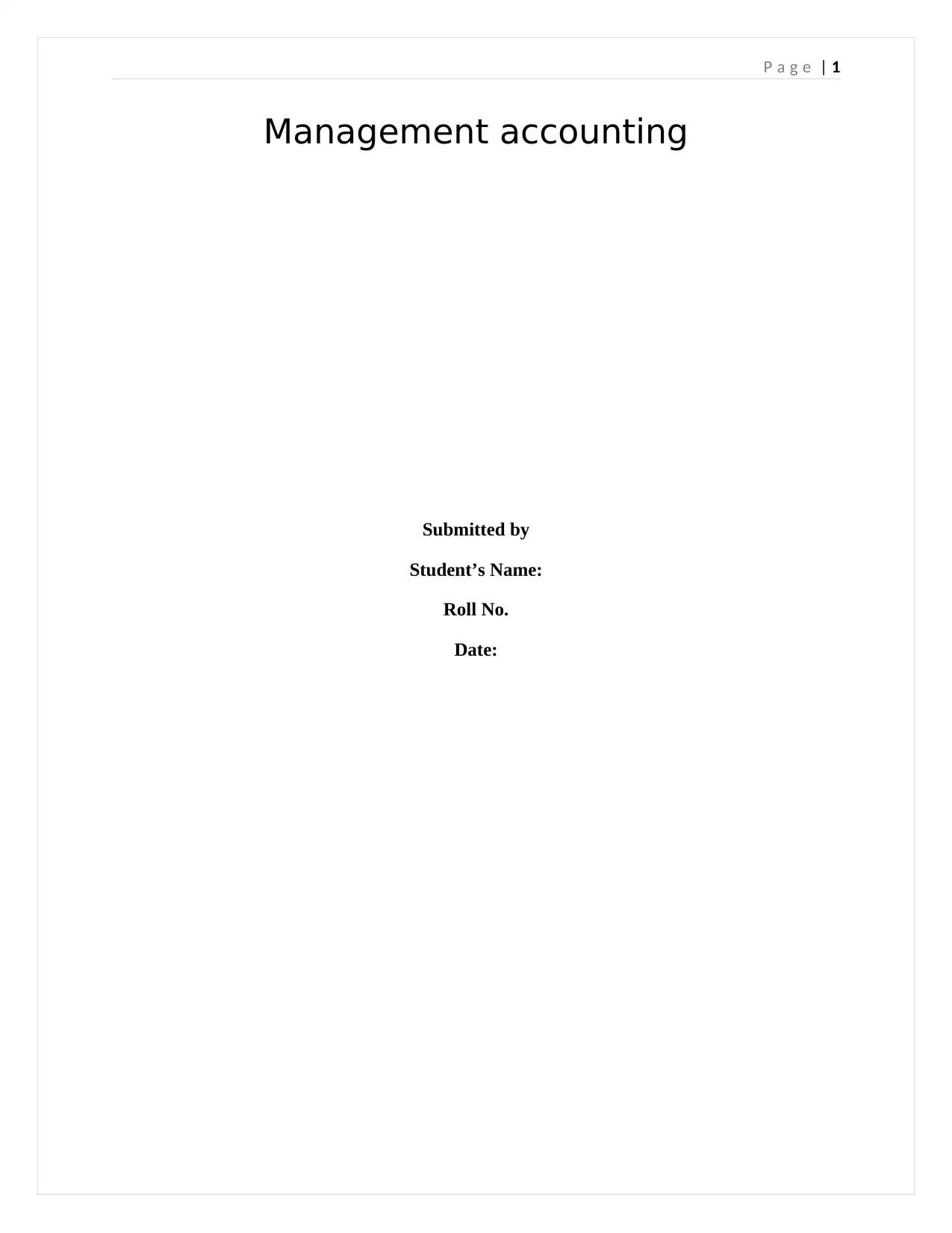
P a g e | 1
Management accounting
Submitted by
Student’s Name:
Roll No.
Date:
Management accounting
Submitted by
Student’s Name:
Roll No.
Date:
Paraphrase This Document
Need a fresh take? Get an instant paraphrase of this document with our AI Paraphraser
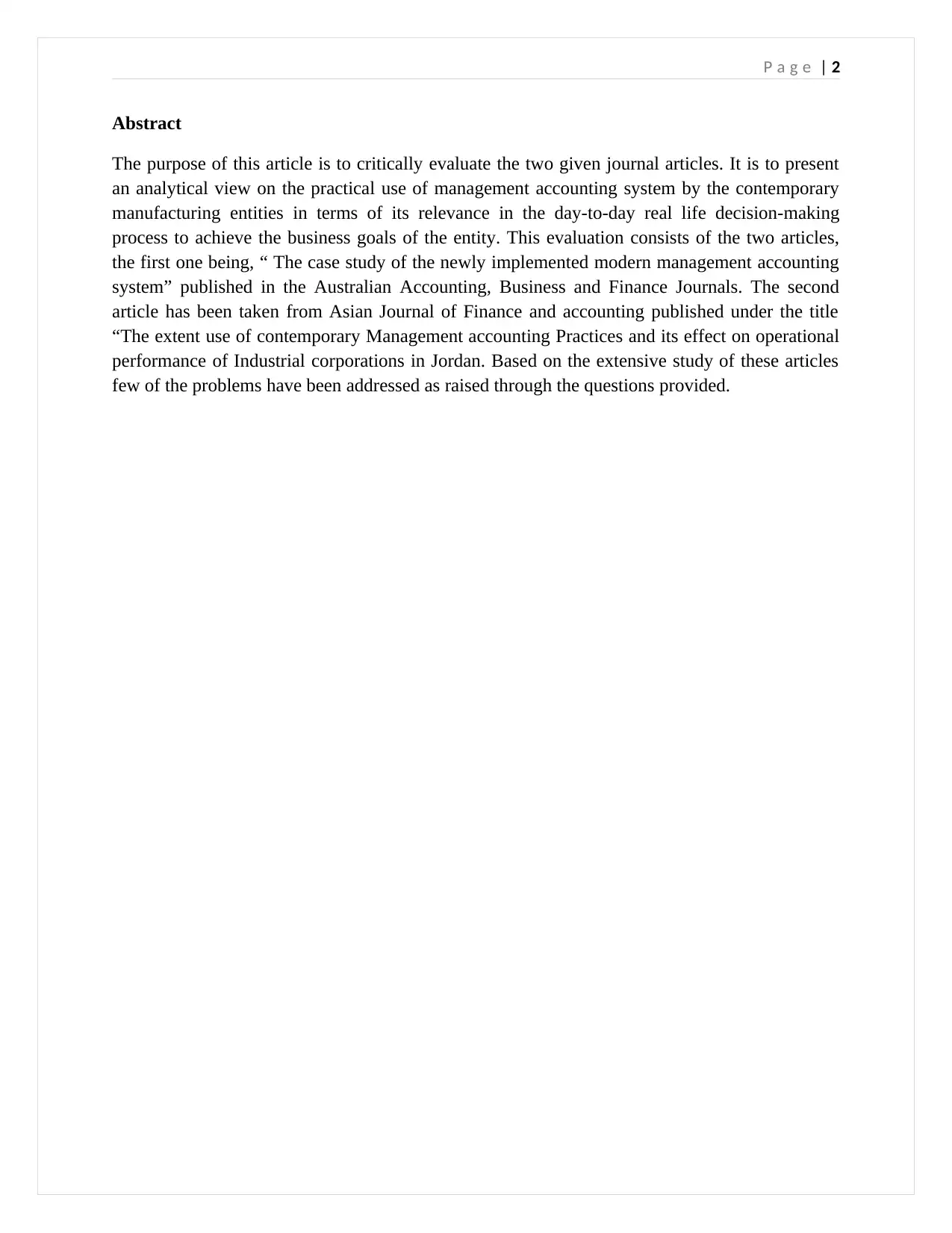
P a g e | 2
Abstract
The purpose of this article is to critically evaluate the two given journal articles. It is to present
an analytical view on the practical use of management accounting system by the contemporary
manufacturing entities in terms of its relevance in the day-to-day real life decision-making
process to achieve the business goals of the entity. This evaluation consists of the two articles,
the first one being, “ The case study of the newly implemented modern management accounting
system” published in the Australian Accounting, Business and Finance Journals. The second
article has been taken from Asian Journal of Finance and accounting published under the title
“The extent use of contemporary Management accounting Practices and its effect on operational
performance of Industrial corporations in Jordan. Based on the extensive study of these articles
few of the problems have been addressed as raised through the questions provided.
Abstract
The purpose of this article is to critically evaluate the two given journal articles. It is to present
an analytical view on the practical use of management accounting system by the contemporary
manufacturing entities in terms of its relevance in the day-to-day real life decision-making
process to achieve the business goals of the entity. This evaluation consists of the two articles,
the first one being, “ The case study of the newly implemented modern management accounting
system” published in the Australian Accounting, Business and Finance Journals. The second
article has been taken from Asian Journal of Finance and accounting published under the title
“The extent use of contemporary Management accounting Practices and its effect on operational
performance of Industrial corporations in Jordan. Based on the extensive study of these articles
few of the problems have been addressed as raised through the questions provided.
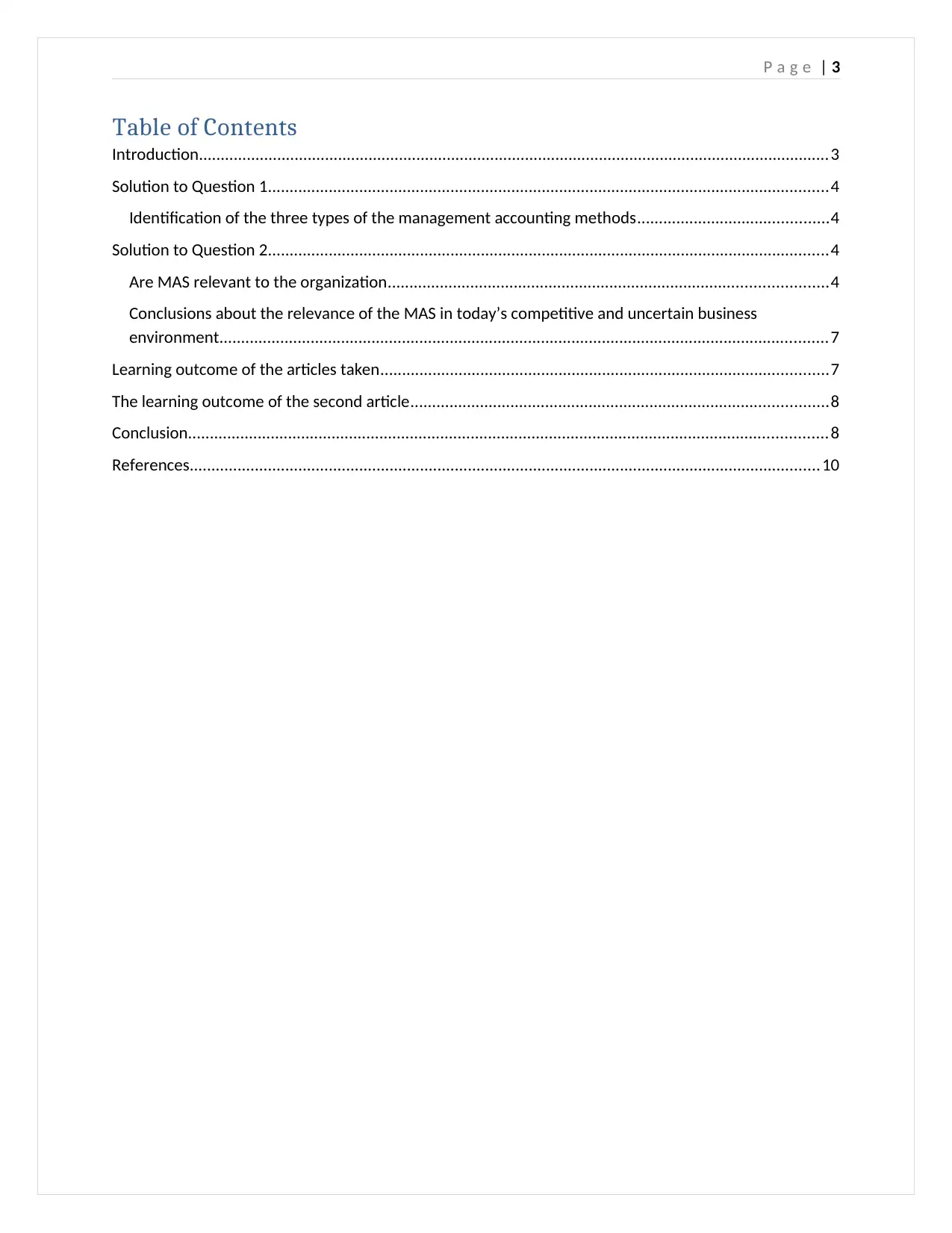
P a g e | 3
Table of Contents
Introduction.................................................................................................................................................3
Solution to Question 1.................................................................................................................................4
Identification of the three types of the management accounting methods............................................4
Solution to Question 2.................................................................................................................................4
Are MAS relevant to the organization.....................................................................................................4
Conclusions about the relevance of the MAS in today’s competitive and uncertain business
environment............................................................................................................................................7
Learning outcome of the articles taken.......................................................................................................7
The learning outcome of the second article................................................................................................8
Conclusion...................................................................................................................................................8
References.................................................................................................................................................10
Table of Contents
Introduction.................................................................................................................................................3
Solution to Question 1.................................................................................................................................4
Identification of the three types of the management accounting methods............................................4
Solution to Question 2.................................................................................................................................4
Are MAS relevant to the organization.....................................................................................................4
Conclusions about the relevance of the MAS in today’s competitive and uncertain business
environment............................................................................................................................................7
Learning outcome of the articles taken.......................................................................................................7
The learning outcome of the second article................................................................................................8
Conclusion...................................................................................................................................................8
References.................................................................................................................................................10
⊘ This is a preview!⊘
Do you want full access?
Subscribe today to unlock all pages.

Trusted by 1+ million students worldwide
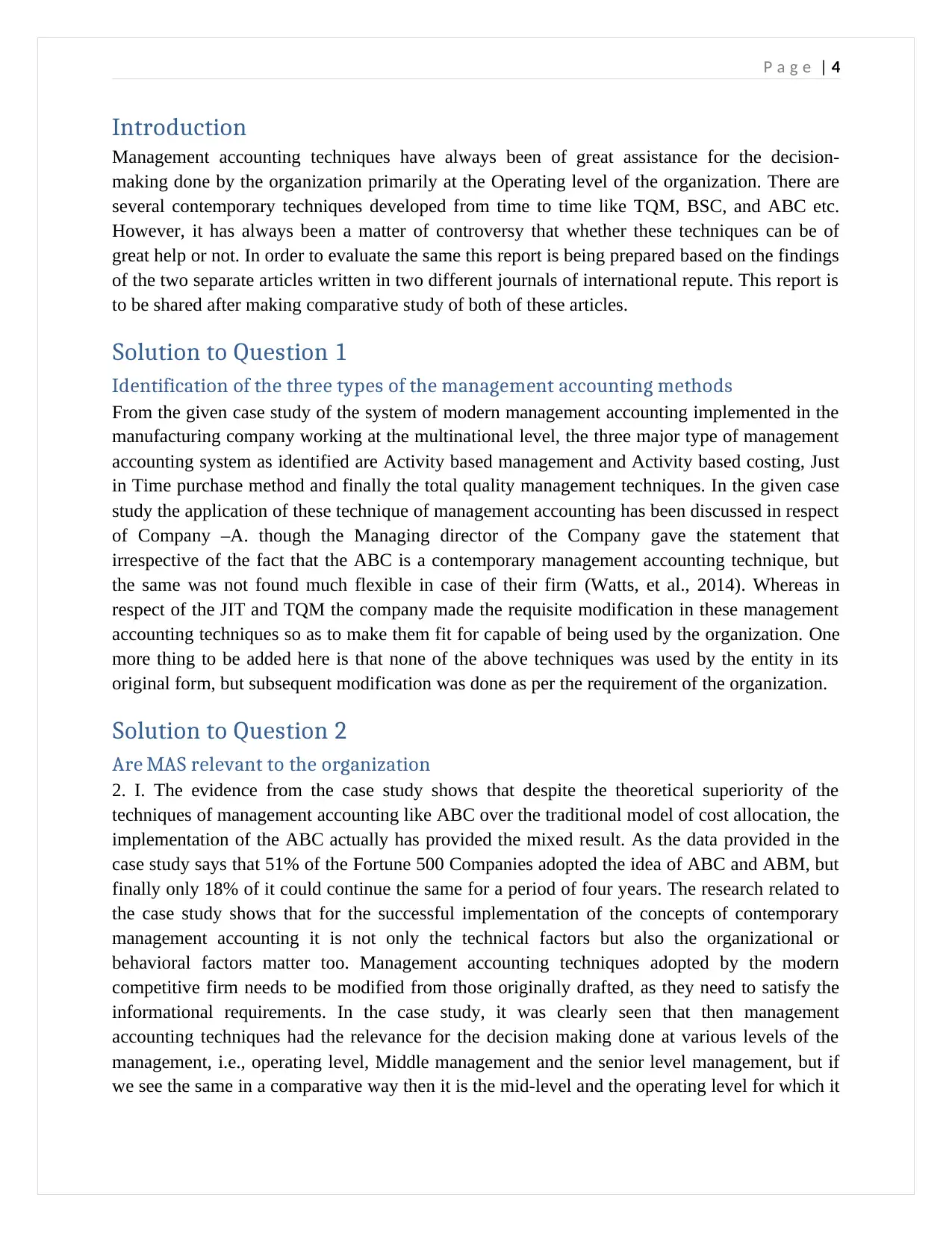
P a g e | 4
Introduction
Management accounting techniques have always been of great assistance for the decision-
making done by the organization primarily at the Operating level of the organization. There are
several contemporary techniques developed from time to time like TQM, BSC, and ABC etc.
However, it has always been a matter of controversy that whether these techniques can be of
great help or not. In order to evaluate the same this report is being prepared based on the findings
of the two separate articles written in two different journals of international repute. This report is
to be shared after making comparative study of both of these articles.
Solution to Question 1
Identification of the three types of the management accounting methods
From the given case study of the system of modern management accounting implemented in the
manufacturing company working at the multinational level, the three major type of management
accounting system as identified are Activity based management and Activity based costing, Just
in Time purchase method and finally the total quality management techniques. In the given case
study the application of these technique of management accounting has been discussed in respect
of Company –A. though the Managing director of the Company gave the statement that
irrespective of the fact that the ABC is a contemporary management accounting technique, but
the same was not found much flexible in case of their firm (Watts, et al., 2014). Whereas in
respect of the JIT and TQM the company made the requisite modification in these management
accounting techniques so as to make them fit for capable of being used by the organization. One
more thing to be added here is that none of the above techniques was used by the entity in its
original form, but subsequent modification was done as per the requirement of the organization.
Solution to Question 2
Are MAS relevant to the organization
2. I. The evidence from the case study shows that despite the theoretical superiority of the
techniques of management accounting like ABC over the traditional model of cost allocation, the
implementation of the ABC actually has provided the mixed result. As the data provided in the
case study says that 51% of the Fortune 500 Companies adopted the idea of ABC and ABM, but
finally only 18% of it could continue the same for a period of four years. The research related to
the case study shows that for the successful implementation of the concepts of contemporary
management accounting it is not only the technical factors but also the organizational or
behavioral factors matter too. Management accounting techniques adopted by the modern
competitive firm needs to be modified from those originally drafted, as they need to satisfy the
informational requirements. In the case study, it was clearly seen that then management
accounting techniques had the relevance for the decision making done at various levels of the
management, i.e., operating level, Middle management and the senior level management, but if
we see the same in a comparative way then it is the mid-level and the operating level for which it
Introduction
Management accounting techniques have always been of great assistance for the decision-
making done by the organization primarily at the Operating level of the organization. There are
several contemporary techniques developed from time to time like TQM, BSC, and ABC etc.
However, it has always been a matter of controversy that whether these techniques can be of
great help or not. In order to evaluate the same this report is being prepared based on the findings
of the two separate articles written in two different journals of international repute. This report is
to be shared after making comparative study of both of these articles.
Solution to Question 1
Identification of the three types of the management accounting methods
From the given case study of the system of modern management accounting implemented in the
manufacturing company working at the multinational level, the three major type of management
accounting system as identified are Activity based management and Activity based costing, Just
in Time purchase method and finally the total quality management techniques. In the given case
study the application of these technique of management accounting has been discussed in respect
of Company –A. though the Managing director of the Company gave the statement that
irrespective of the fact that the ABC is a contemporary management accounting technique, but
the same was not found much flexible in case of their firm (Watts, et al., 2014). Whereas in
respect of the JIT and TQM the company made the requisite modification in these management
accounting techniques so as to make them fit for capable of being used by the organization. One
more thing to be added here is that none of the above techniques was used by the entity in its
original form, but subsequent modification was done as per the requirement of the organization.
Solution to Question 2
Are MAS relevant to the organization
2. I. The evidence from the case study shows that despite the theoretical superiority of the
techniques of management accounting like ABC over the traditional model of cost allocation, the
implementation of the ABC actually has provided the mixed result. As the data provided in the
case study says that 51% of the Fortune 500 Companies adopted the idea of ABC and ABM, but
finally only 18% of it could continue the same for a period of four years. The research related to
the case study shows that for the successful implementation of the concepts of contemporary
management accounting it is not only the technical factors but also the organizational or
behavioral factors matter too. Management accounting techniques adopted by the modern
competitive firm needs to be modified from those originally drafted, as they need to satisfy the
informational requirements. In the case study, it was clearly seen that then management
accounting techniques had the relevance for the decision making done at various levels of the
management, i.e., operating level, Middle management and the senior level management, but if
we see the same in a comparative way then it is the mid-level and the operating level for which it
Paraphrase This Document
Need a fresh take? Get an instant paraphrase of this document with our AI Paraphraser
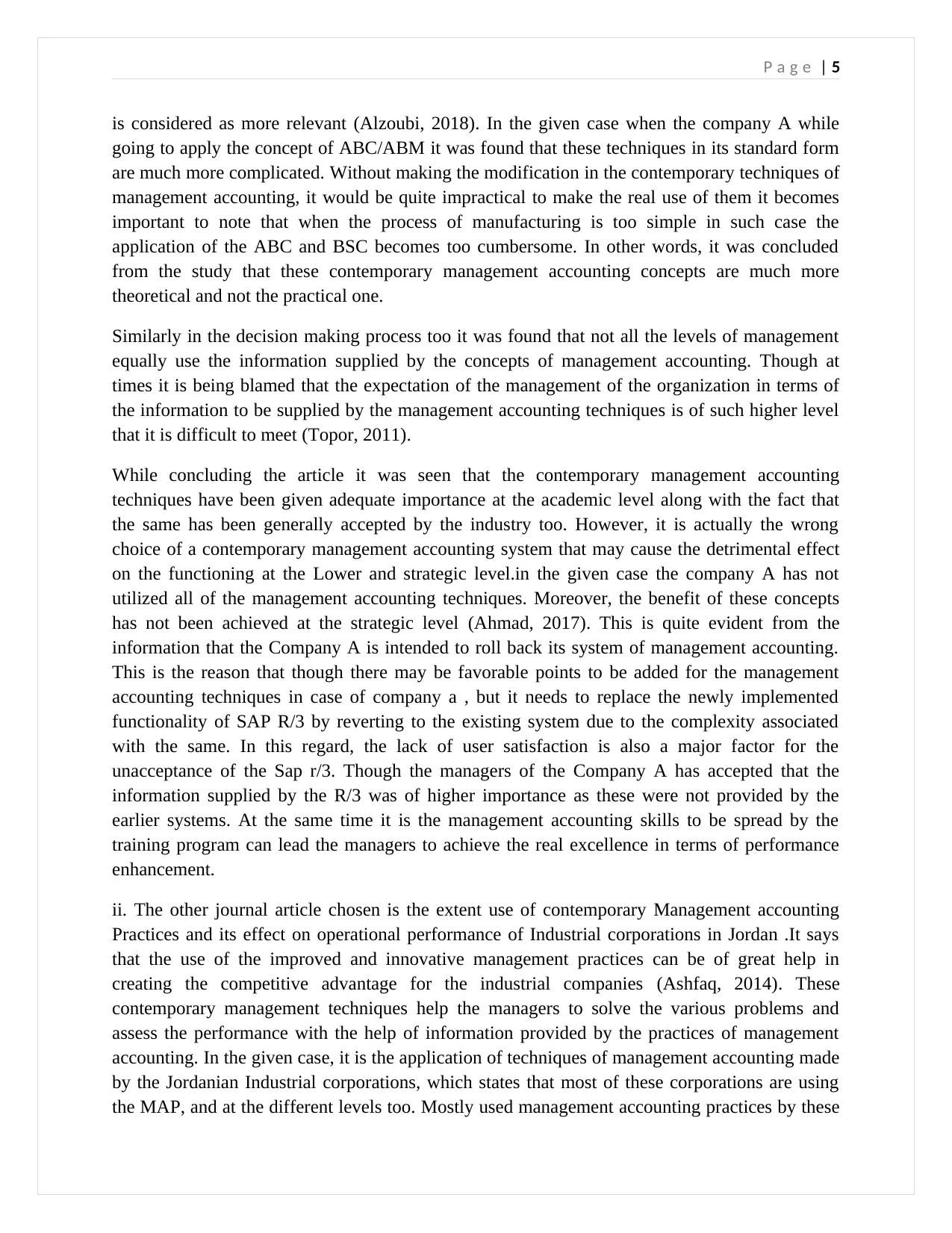
P a g e | 5
is considered as more relevant (Alzoubi, 2018). In the given case when the company A while
going to apply the concept of ABC/ABM it was found that these techniques in its standard form
are much more complicated. Without making the modification in the contemporary techniques of
management accounting, it would be quite impractical to make the real use of them it becomes
important to note that when the process of manufacturing is too simple in such case the
application of the ABC and BSC becomes too cumbersome. In other words, it was concluded
from the study that these contemporary management accounting concepts are much more
theoretical and not the practical one.
Similarly in the decision making process too it was found that not all the levels of management
equally use the information supplied by the concepts of management accounting. Though at
times it is being blamed that the expectation of the management of the organization in terms of
the information to be supplied by the management accounting techniques is of such higher level
that it is difficult to meet (Topor, 2011).
While concluding the article it was seen that the contemporary management accounting
techniques have been given adequate importance at the academic level along with the fact that
the same has been generally accepted by the industry too. However, it is actually the wrong
choice of a contemporary management accounting system that may cause the detrimental effect
on the functioning at the Lower and strategic level.in the given case the company A has not
utilized all of the management accounting techniques. Moreover, the benefit of these concepts
has not been achieved at the strategic level (Ahmad, 2017). This is quite evident from the
information that the Company A is intended to roll back its system of management accounting.
This is the reason that though there may be favorable points to be added for the management
accounting techniques in case of company a , but it needs to replace the newly implemented
functionality of SAP R/3 by reverting to the existing system due to the complexity associated
with the same. In this regard, the lack of user satisfaction is also a major factor for the
unacceptance of the Sap r/3. Though the managers of the Company A has accepted that the
information supplied by the R/3 was of higher importance as these were not provided by the
earlier systems. At the same time it is the management accounting skills to be spread by the
training program can lead the managers to achieve the real excellence in terms of performance
enhancement.
ii. The other journal article chosen is the extent use of contemporary Management accounting
Practices and its effect on operational performance of Industrial corporations in Jordan .It says
that the use of the improved and innovative management practices can be of great help in
creating the competitive advantage for the industrial companies (Ashfaq, 2014). These
contemporary management techniques help the managers to solve the various problems and
assess the performance with the help of information provided by the practices of management
accounting. In the given case, it is the application of techniques of management accounting made
by the Jordanian Industrial corporations, which states that most of these corporations are using
the MAP, and at the different levels too. Mostly used management accounting practices by these
is considered as more relevant (Alzoubi, 2018). In the given case when the company A while
going to apply the concept of ABC/ABM it was found that these techniques in its standard form
are much more complicated. Without making the modification in the contemporary techniques of
management accounting, it would be quite impractical to make the real use of them it becomes
important to note that when the process of manufacturing is too simple in such case the
application of the ABC and BSC becomes too cumbersome. In other words, it was concluded
from the study that these contemporary management accounting concepts are much more
theoretical and not the practical one.
Similarly in the decision making process too it was found that not all the levels of management
equally use the information supplied by the concepts of management accounting. Though at
times it is being blamed that the expectation of the management of the organization in terms of
the information to be supplied by the management accounting techniques is of such higher level
that it is difficult to meet (Topor, 2011).
While concluding the article it was seen that the contemporary management accounting
techniques have been given adequate importance at the academic level along with the fact that
the same has been generally accepted by the industry too. However, it is actually the wrong
choice of a contemporary management accounting system that may cause the detrimental effect
on the functioning at the Lower and strategic level.in the given case the company A has not
utilized all of the management accounting techniques. Moreover, the benefit of these concepts
has not been achieved at the strategic level (Ahmad, 2017). This is quite evident from the
information that the Company A is intended to roll back its system of management accounting.
This is the reason that though there may be favorable points to be added for the management
accounting techniques in case of company a , but it needs to replace the newly implemented
functionality of SAP R/3 by reverting to the existing system due to the complexity associated
with the same. In this regard, the lack of user satisfaction is also a major factor for the
unacceptance of the Sap r/3. Though the managers of the Company A has accepted that the
information supplied by the R/3 was of higher importance as these were not provided by the
earlier systems. At the same time it is the management accounting skills to be spread by the
training program can lead the managers to achieve the real excellence in terms of performance
enhancement.
ii. The other journal article chosen is the extent use of contemporary Management accounting
Practices and its effect on operational performance of Industrial corporations in Jordan .It says
that the use of the improved and innovative management practices can be of great help in
creating the competitive advantage for the industrial companies (Ashfaq, 2014). These
contemporary management techniques help the managers to solve the various problems and
assess the performance with the help of information provided by the practices of management
accounting. In the given case, it is the application of techniques of management accounting made
by the Jordanian Industrial corporations, which states that most of these corporations are using
the MAP, and at the different levels too. Mostly used management accounting practices by these
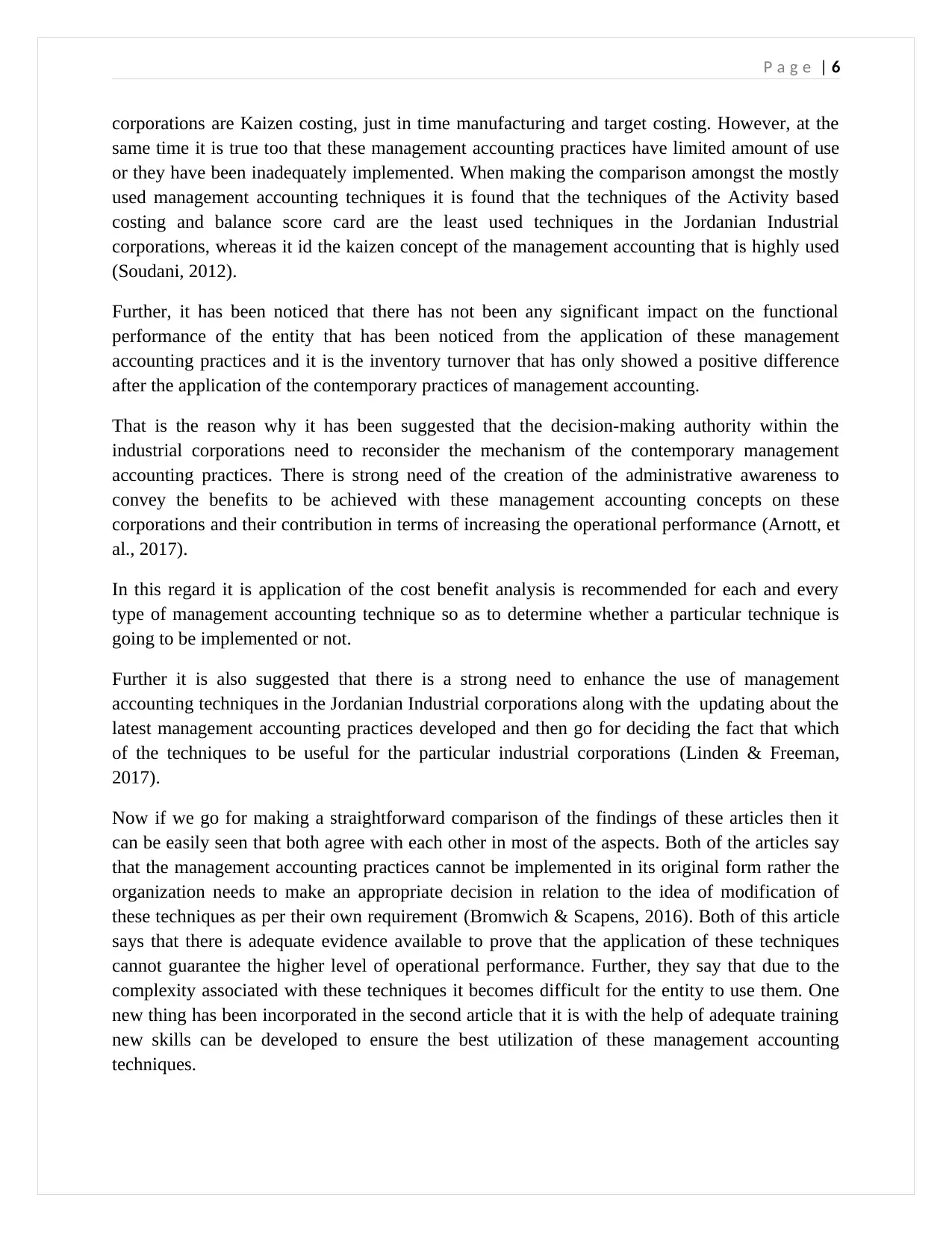
P a g e | 6
corporations are Kaizen costing, just in time manufacturing and target costing. However, at the
same time it is true too that these management accounting practices have limited amount of use
or they have been inadequately implemented. When making the comparison amongst the mostly
used management accounting techniques it is found that the techniques of the Activity based
costing and balance score card are the least used techniques in the Jordanian Industrial
corporations, whereas it id the kaizen concept of the management accounting that is highly used
(Soudani, 2012).
Further, it has been noticed that there has not been any significant impact on the functional
performance of the entity that has been noticed from the application of these management
accounting practices and it is the inventory turnover that has only showed a positive difference
after the application of the contemporary practices of management accounting.
That is the reason why it has been suggested that the decision-making authority within the
industrial corporations need to reconsider the mechanism of the contemporary management
accounting practices. There is strong need of the creation of the administrative awareness to
convey the benefits to be achieved with these management accounting concepts on these
corporations and their contribution in terms of increasing the operational performance (Arnott, et
al., 2017).
In this regard it is application of the cost benefit analysis is recommended for each and every
type of management accounting technique so as to determine whether a particular technique is
going to be implemented or not.
Further it is also suggested that there is a strong need to enhance the use of management
accounting techniques in the Jordanian Industrial corporations along with the updating about the
latest management accounting practices developed and then go for deciding the fact that which
of the techniques to be useful for the particular industrial corporations (Linden & Freeman,
2017).
Now if we go for making a straightforward comparison of the findings of these articles then it
can be easily seen that both agree with each other in most of the aspects. Both of the articles say
that the management accounting practices cannot be implemented in its original form rather the
organization needs to make an appropriate decision in relation to the idea of modification of
these techniques as per their own requirement (Bromwich & Scapens, 2016). Both of this article
says that there is adequate evidence available to prove that the application of these techniques
cannot guarantee the higher level of operational performance. Further, they say that due to the
complexity associated with these techniques it becomes difficult for the entity to use them. One
new thing has been incorporated in the second article that it is with the help of adequate training
new skills can be developed to ensure the best utilization of these management accounting
techniques.
corporations are Kaizen costing, just in time manufacturing and target costing. However, at the
same time it is true too that these management accounting practices have limited amount of use
or they have been inadequately implemented. When making the comparison amongst the mostly
used management accounting techniques it is found that the techniques of the Activity based
costing and balance score card are the least used techniques in the Jordanian Industrial
corporations, whereas it id the kaizen concept of the management accounting that is highly used
(Soudani, 2012).
Further, it has been noticed that there has not been any significant impact on the functional
performance of the entity that has been noticed from the application of these management
accounting practices and it is the inventory turnover that has only showed a positive difference
after the application of the contemporary practices of management accounting.
That is the reason why it has been suggested that the decision-making authority within the
industrial corporations need to reconsider the mechanism of the contemporary management
accounting practices. There is strong need of the creation of the administrative awareness to
convey the benefits to be achieved with these management accounting concepts on these
corporations and their contribution in terms of increasing the operational performance (Arnott, et
al., 2017).
In this regard it is application of the cost benefit analysis is recommended for each and every
type of management accounting technique so as to determine whether a particular technique is
going to be implemented or not.
Further it is also suggested that there is a strong need to enhance the use of management
accounting techniques in the Jordanian Industrial corporations along with the updating about the
latest management accounting practices developed and then go for deciding the fact that which
of the techniques to be useful for the particular industrial corporations (Linden & Freeman,
2017).
Now if we go for making a straightforward comparison of the findings of these articles then it
can be easily seen that both agree with each other in most of the aspects. Both of the articles say
that the management accounting practices cannot be implemented in its original form rather the
organization needs to make an appropriate decision in relation to the idea of modification of
these techniques as per their own requirement (Bromwich & Scapens, 2016). Both of this article
says that there is adequate evidence available to prove that the application of these techniques
cannot guarantee the higher level of operational performance. Further, they say that due to the
complexity associated with these techniques it becomes difficult for the entity to use them. One
new thing has been incorporated in the second article that it is with the help of adequate training
new skills can be developed to ensure the best utilization of these management accounting
techniques.
⊘ This is a preview!⊘
Do you want full access?
Subscribe today to unlock all pages.

Trusted by 1+ million students worldwide
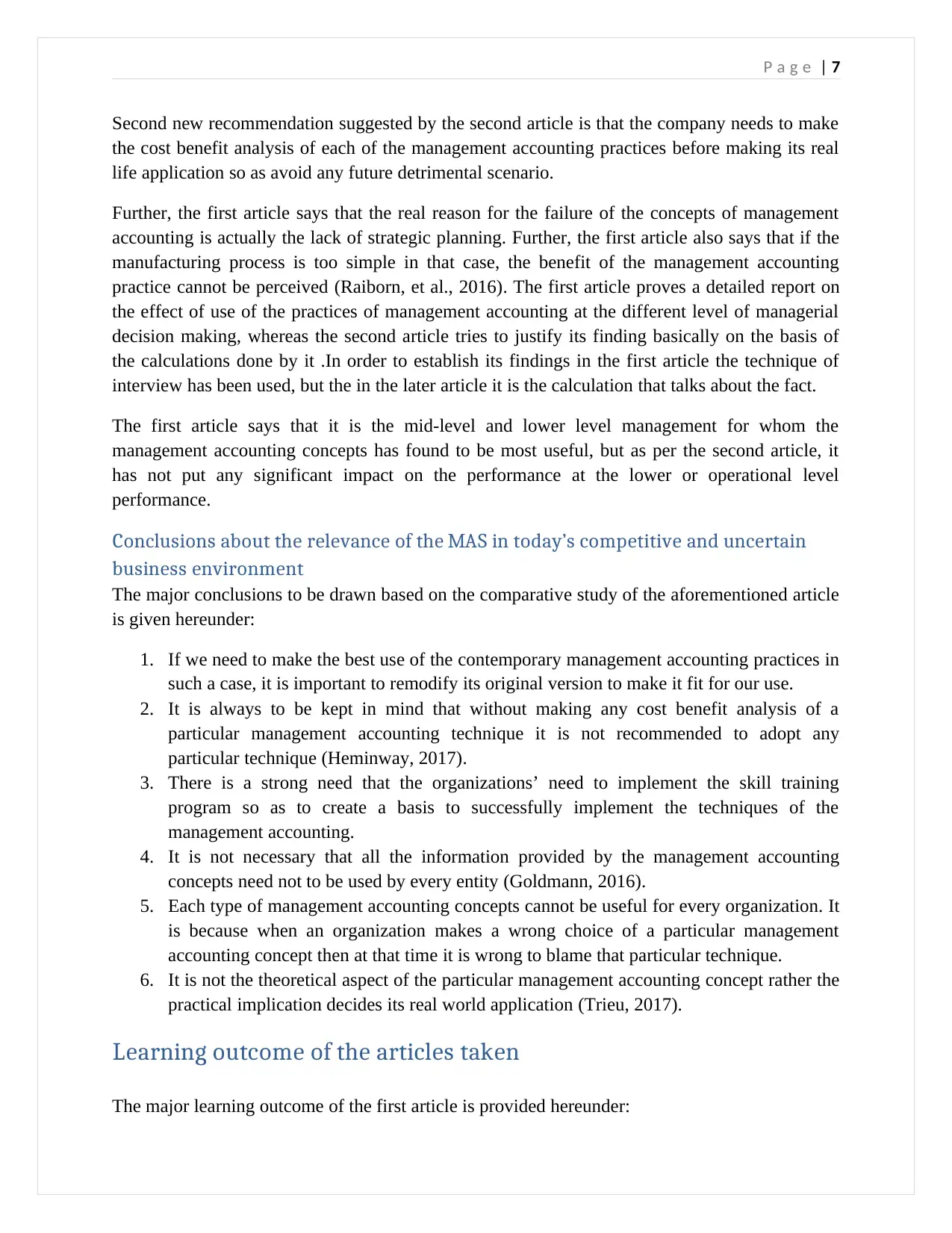
P a g e | 7
Second new recommendation suggested by the second article is that the company needs to make
the cost benefit analysis of each of the management accounting practices before making its real
life application so as avoid any future detrimental scenario.
Further, the first article says that the real reason for the failure of the concepts of management
accounting is actually the lack of strategic planning. Further, the first article also says that if the
manufacturing process is too simple in that case, the benefit of the management accounting
practice cannot be perceived (Raiborn, et al., 2016). The first article proves a detailed report on
the effect of use of the practices of management accounting at the different level of managerial
decision making, whereas the second article tries to justify its finding basically on the basis of
the calculations done by it .In order to establish its findings in the first article the technique of
interview has been used, but the in the later article it is the calculation that talks about the fact.
The first article says that it is the mid-level and lower level management for whom the
management accounting concepts has found to be most useful, but as per the second article, it
has not put any significant impact on the performance at the lower or operational level
performance.
Conclusions about the relevance of the MAS in today’s competitive and uncertain
business environment
The major conclusions to be drawn based on the comparative study of the aforementioned article
is given hereunder:
1. If we need to make the best use of the contemporary management accounting practices in
such a case, it is important to remodify its original version to make it fit for our use.
2. It is always to be kept in mind that without making any cost benefit analysis of a
particular management accounting technique it is not recommended to adopt any
particular technique (Heminway, 2017).
3. There is a strong need that the organizations’ need to implement the skill training
program so as to create a basis to successfully implement the techniques of the
management accounting.
4. It is not necessary that all the information provided by the management accounting
concepts need not to be used by every entity (Goldmann, 2016).
5. Each type of management accounting concepts cannot be useful for every organization. It
is because when an organization makes a wrong choice of a particular management
accounting concept then at that time it is wrong to blame that particular technique.
6. It is not the theoretical aspect of the particular management accounting concept rather the
practical implication decides its real world application (Trieu, 2017).
Learning outcome of the articles taken
The major learning outcome of the first article is provided hereunder:
Second new recommendation suggested by the second article is that the company needs to make
the cost benefit analysis of each of the management accounting practices before making its real
life application so as avoid any future detrimental scenario.
Further, the first article says that the real reason for the failure of the concepts of management
accounting is actually the lack of strategic planning. Further, the first article also says that if the
manufacturing process is too simple in that case, the benefit of the management accounting
practice cannot be perceived (Raiborn, et al., 2016). The first article proves a detailed report on
the effect of use of the practices of management accounting at the different level of managerial
decision making, whereas the second article tries to justify its finding basically on the basis of
the calculations done by it .In order to establish its findings in the first article the technique of
interview has been used, but the in the later article it is the calculation that talks about the fact.
The first article says that it is the mid-level and lower level management for whom the
management accounting concepts has found to be most useful, but as per the second article, it
has not put any significant impact on the performance at the lower or operational level
performance.
Conclusions about the relevance of the MAS in today’s competitive and uncertain
business environment
The major conclusions to be drawn based on the comparative study of the aforementioned article
is given hereunder:
1. If we need to make the best use of the contemporary management accounting practices in
such a case, it is important to remodify its original version to make it fit for our use.
2. It is always to be kept in mind that without making any cost benefit analysis of a
particular management accounting technique it is not recommended to adopt any
particular technique (Heminway, 2017).
3. There is a strong need that the organizations’ need to implement the skill training
program so as to create a basis to successfully implement the techniques of the
management accounting.
4. It is not necessary that all the information provided by the management accounting
concepts need not to be used by every entity (Goldmann, 2016).
5. Each type of management accounting concepts cannot be useful for every organization. It
is because when an organization makes a wrong choice of a particular management
accounting concept then at that time it is wrong to blame that particular technique.
6. It is not the theoretical aspect of the particular management accounting concept rather the
practical implication decides its real world application (Trieu, 2017).
Learning outcome of the articles taken
The major learning outcome of the first article is provided hereunder:
Paraphrase This Document
Need a fresh take? Get an instant paraphrase of this document with our AI Paraphraser
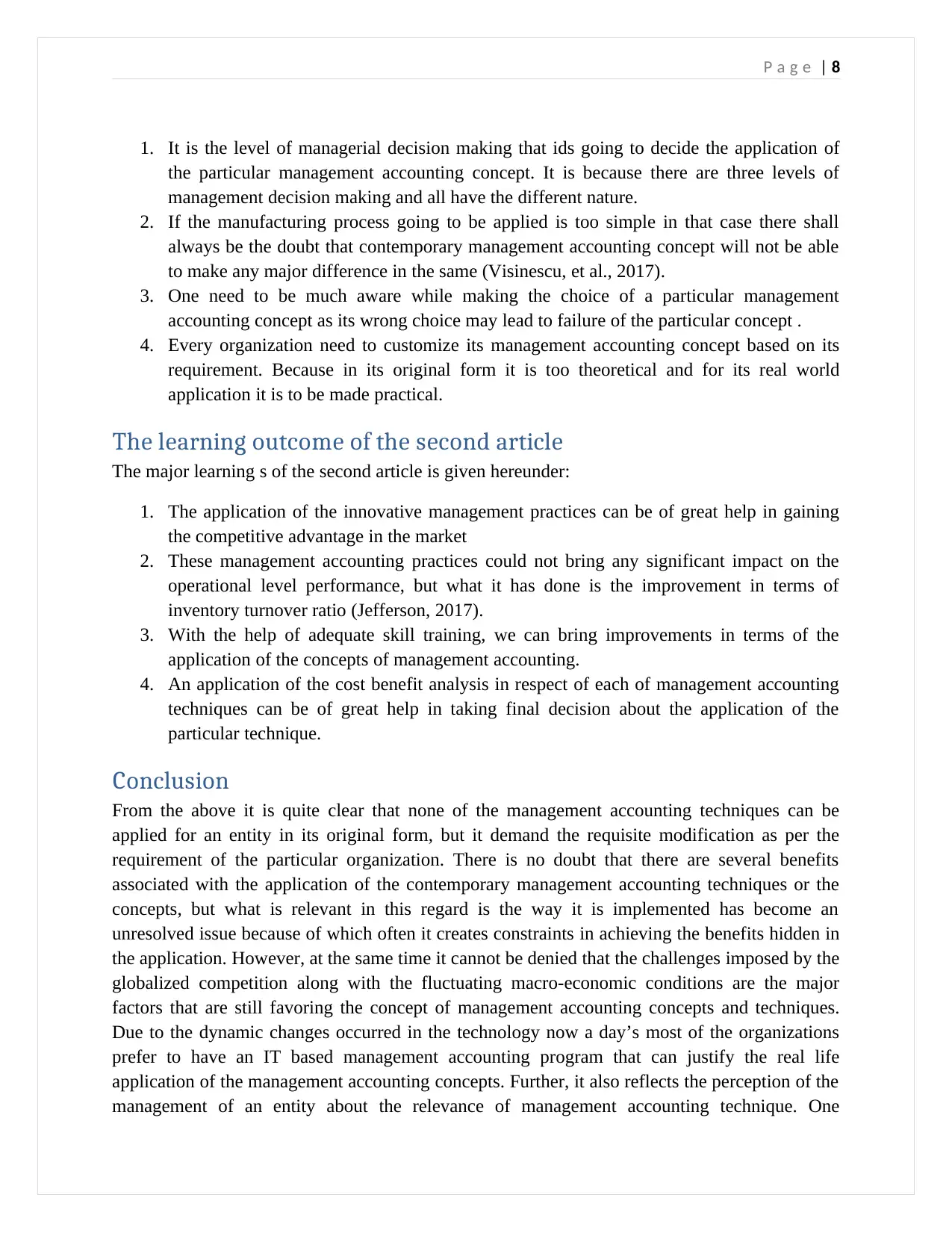
P a g e | 8
1. It is the level of managerial decision making that ids going to decide the application of
the particular management accounting concept. It is because there are three levels of
management decision making and all have the different nature.
2. If the manufacturing process going to be applied is too simple in that case there shall
always be the doubt that contemporary management accounting concept will not be able
to make any major difference in the same (Visinescu, et al., 2017).
3. One need to be much aware while making the choice of a particular management
accounting concept as its wrong choice may lead to failure of the particular concept .
4. Every organization need to customize its management accounting concept based on its
requirement. Because in its original form it is too theoretical and for its real world
application it is to be made practical.
The learning outcome of the second article
The major learning s of the second article is given hereunder:
1. The application of the innovative management practices can be of great help in gaining
the competitive advantage in the market
2. These management accounting practices could not bring any significant impact on the
operational level performance, but what it has done is the improvement in terms of
inventory turnover ratio (Jefferson, 2017).
3. With the help of adequate skill training, we can bring improvements in terms of the
application of the concepts of management accounting.
4. An application of the cost benefit analysis in respect of each of management accounting
techniques can be of great help in taking final decision about the application of the
particular technique.
Conclusion
From the above it is quite clear that none of the management accounting techniques can be
applied for an entity in its original form, but it demand the requisite modification as per the
requirement of the particular organization. There is no doubt that there are several benefits
associated with the application of the contemporary management accounting techniques or the
concepts, but what is relevant in this regard is the way it is implemented has become an
unresolved issue because of which often it creates constraints in achieving the benefits hidden in
the application. However, at the same time it cannot be denied that the challenges imposed by the
globalized competition along with the fluctuating macro-economic conditions are the major
factors that are still favoring the concept of management accounting concepts and techniques.
Due to the dynamic changes occurred in the technology now a day’s most of the organizations
prefer to have an IT based management accounting program that can justify the real life
application of the management accounting concepts. Further, it also reflects the perception of the
management of an entity about the relevance of management accounting technique. One
1. It is the level of managerial decision making that ids going to decide the application of
the particular management accounting concept. It is because there are three levels of
management decision making and all have the different nature.
2. If the manufacturing process going to be applied is too simple in that case there shall
always be the doubt that contemporary management accounting concept will not be able
to make any major difference in the same (Visinescu, et al., 2017).
3. One need to be much aware while making the choice of a particular management
accounting concept as its wrong choice may lead to failure of the particular concept .
4. Every organization need to customize its management accounting concept based on its
requirement. Because in its original form it is too theoretical and for its real world
application it is to be made practical.
The learning outcome of the second article
The major learning s of the second article is given hereunder:
1. The application of the innovative management practices can be of great help in gaining
the competitive advantage in the market
2. These management accounting practices could not bring any significant impact on the
operational level performance, but what it has done is the improvement in terms of
inventory turnover ratio (Jefferson, 2017).
3. With the help of adequate skill training, we can bring improvements in terms of the
application of the concepts of management accounting.
4. An application of the cost benefit analysis in respect of each of management accounting
techniques can be of great help in taking final decision about the application of the
particular technique.
Conclusion
From the above it is quite clear that none of the management accounting techniques can be
applied for an entity in its original form, but it demand the requisite modification as per the
requirement of the particular organization. There is no doubt that there are several benefits
associated with the application of the contemporary management accounting techniques or the
concepts, but what is relevant in this regard is the way it is implemented has become an
unresolved issue because of which often it creates constraints in achieving the benefits hidden in
the application. However, at the same time it cannot be denied that the challenges imposed by the
globalized competition along with the fluctuating macro-economic conditions are the major
factors that are still favoring the concept of management accounting concepts and techniques.
Due to the dynamic changes occurred in the technology now a day’s most of the organizations
prefer to have an IT based management accounting program that can justify the real life
application of the management accounting concepts. Further, it also reflects the perception of the
management of an entity about the relevance of management accounting technique. One
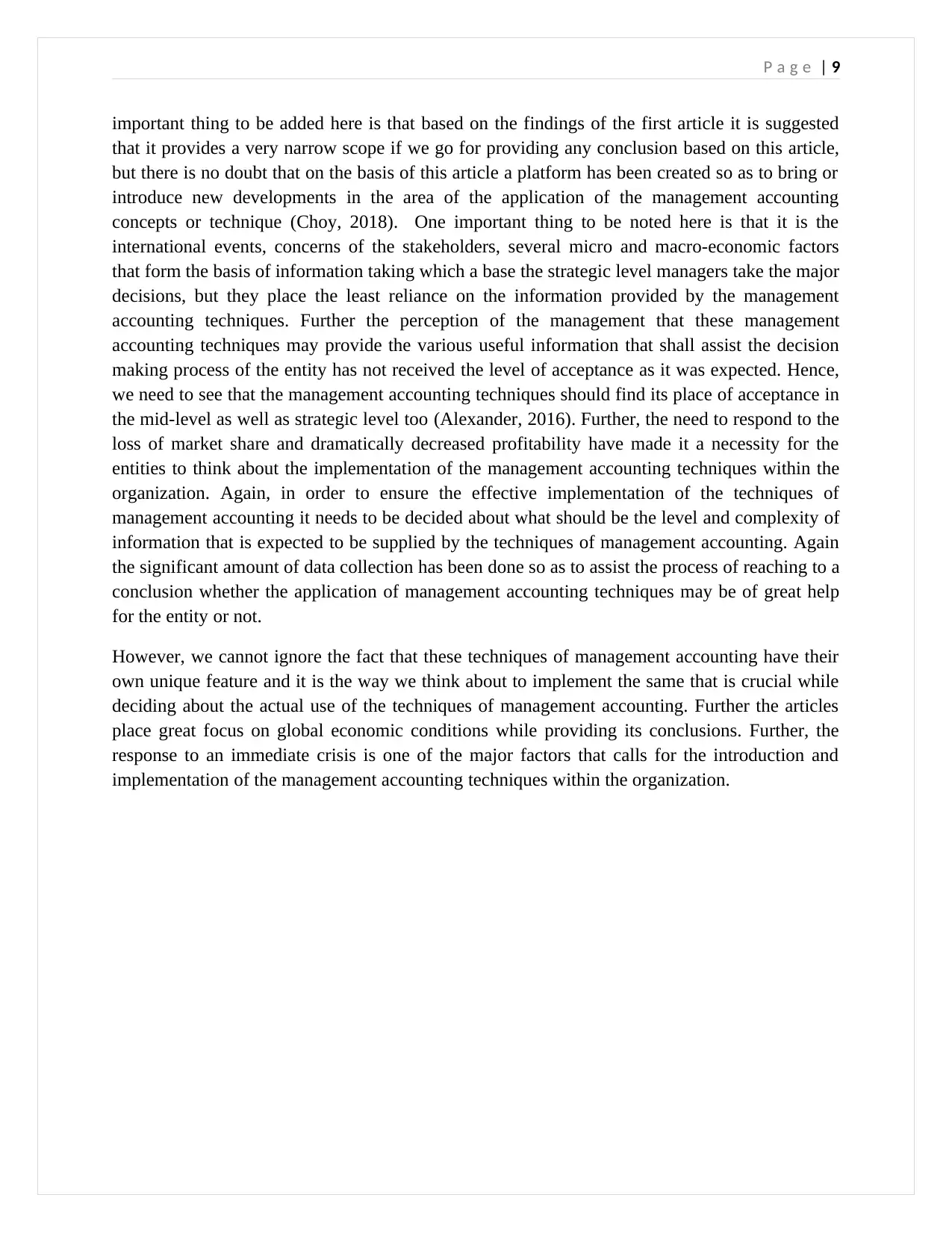
P a g e | 9
important thing to be added here is that based on the findings of the first article it is suggested
that it provides a very narrow scope if we go for providing any conclusion based on this article,
but there is no doubt that on the basis of this article a platform has been created so as to bring or
introduce new developments in the area of the application of the management accounting
concepts or technique (Choy, 2018). One important thing to be noted here is that it is the
international events, concerns of the stakeholders, several micro and macro-economic factors
that form the basis of information taking which a base the strategic level managers take the major
decisions, but they place the least reliance on the information provided by the management
accounting techniques. Further the perception of the management that these management
accounting techniques may provide the various useful information that shall assist the decision
making process of the entity has not received the level of acceptance as it was expected. Hence,
we need to see that the management accounting techniques should find its place of acceptance in
the mid-level as well as strategic level too (Alexander, 2016). Further, the need to respond to the
loss of market share and dramatically decreased profitability have made it a necessity for the
entities to think about the implementation of the management accounting techniques within the
organization. Again, in order to ensure the effective implementation of the techniques of
management accounting it needs to be decided about what should be the level and complexity of
information that is expected to be supplied by the techniques of management accounting. Again
the significant amount of data collection has been done so as to assist the process of reaching to a
conclusion whether the application of management accounting techniques may be of great help
for the entity or not.
However, we cannot ignore the fact that these techniques of management accounting have their
own unique feature and it is the way we think about to implement the same that is crucial while
deciding about the actual use of the techniques of management accounting. Further the articles
place great focus on global economic conditions while providing its conclusions. Further, the
response to an immediate crisis is one of the major factors that calls for the introduction and
implementation of the management accounting techniques within the organization.
important thing to be added here is that based on the findings of the first article it is suggested
that it provides a very narrow scope if we go for providing any conclusion based on this article,
but there is no doubt that on the basis of this article a platform has been created so as to bring or
introduce new developments in the area of the application of the management accounting
concepts or technique (Choy, 2018). One important thing to be noted here is that it is the
international events, concerns of the stakeholders, several micro and macro-economic factors
that form the basis of information taking which a base the strategic level managers take the major
decisions, but they place the least reliance on the information provided by the management
accounting techniques. Further the perception of the management that these management
accounting techniques may provide the various useful information that shall assist the decision
making process of the entity has not received the level of acceptance as it was expected. Hence,
we need to see that the management accounting techniques should find its place of acceptance in
the mid-level as well as strategic level too (Alexander, 2016). Further, the need to respond to the
loss of market share and dramatically decreased profitability have made it a necessity for the
entities to think about the implementation of the management accounting techniques within the
organization. Again, in order to ensure the effective implementation of the techniques of
management accounting it needs to be decided about what should be the level and complexity of
information that is expected to be supplied by the techniques of management accounting. Again
the significant amount of data collection has been done so as to assist the process of reaching to a
conclusion whether the application of management accounting techniques may be of great help
for the entity or not.
However, we cannot ignore the fact that these techniques of management accounting have their
own unique feature and it is the way we think about to implement the same that is crucial while
deciding about the actual use of the techniques of management accounting. Further the articles
place great focus on global economic conditions while providing its conclusions. Further, the
response to an immediate crisis is one of the major factors that calls for the introduction and
implementation of the management accounting techniques within the organization.
⊘ This is a preview!⊘
Do you want full access?
Subscribe today to unlock all pages.

Trusted by 1+ million students worldwide
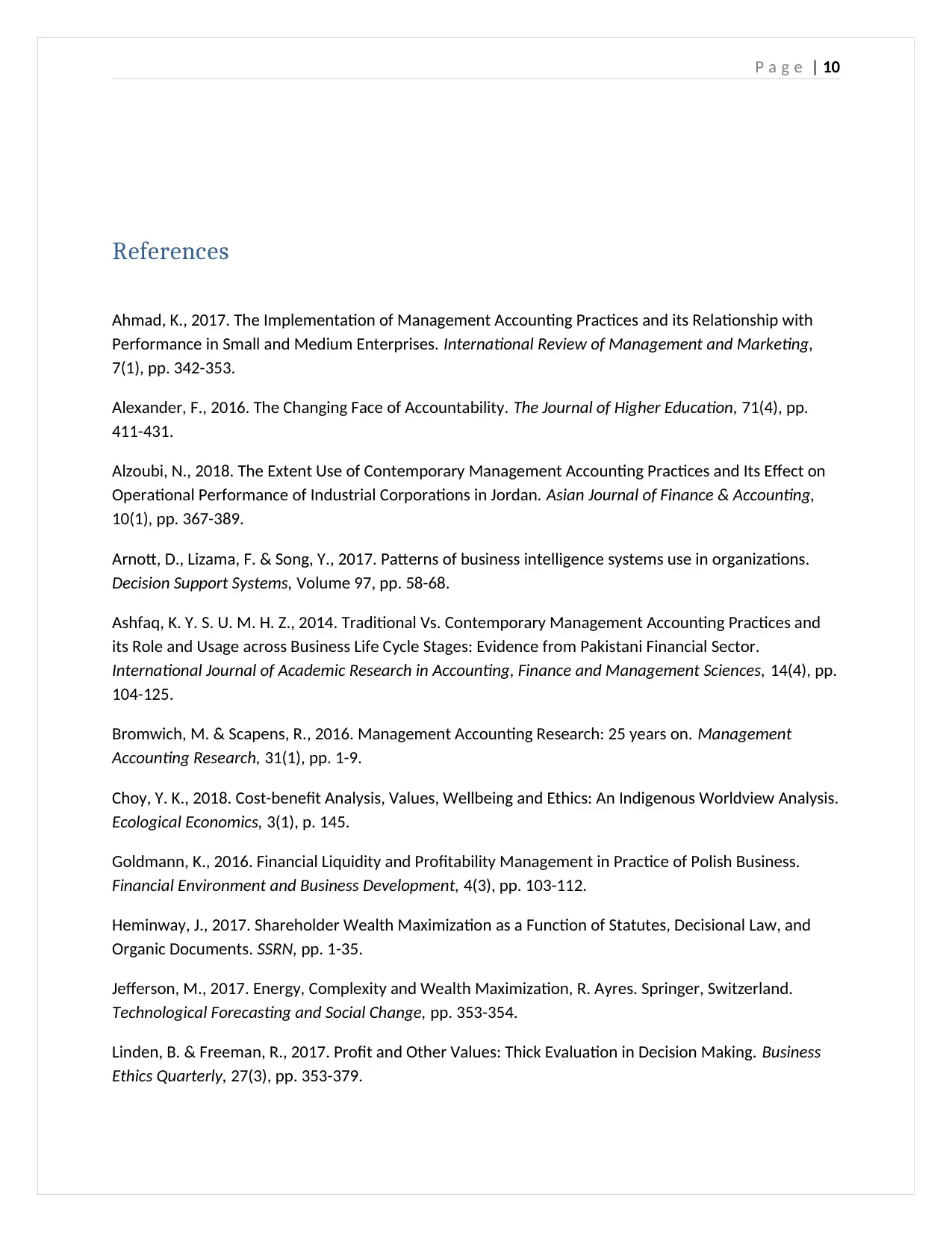
P a g e | 10
References
Ahmad, K., 2017. The Implementation of Management Accounting Practices and its Relationship with
Performance in Small and Medium Enterprises. International Review of Management and Marketing,
7(1), pp. 342-353.
Alexander, F., 2016. The Changing Face of Accountability. The Journal of Higher Education, 71(4), pp.
411-431.
Alzoubi, N., 2018. The Extent Use of Contemporary Management Accounting Practices and Its Effect on
Operational Performance of Industrial Corporations in Jordan. Asian Journal of Finance & Accounting,
10(1), pp. 367-389.
Arnott, D., Lizama, F. & Song, Y., 2017. Patterns of business intelligence systems use in organizations.
Decision Support Systems, Volume 97, pp. 58-68.
Ashfaq, K. Y. S. U. M. H. Z., 2014. Traditional Vs. Contemporary Management Accounting Practices and
its Role and Usage across Business Life Cycle Stages: Evidence from Pakistani Financial Sector.
International Journal of Academic Research in Accounting, Finance and Management Sciences, 14(4), pp.
104-125.
Bromwich, M. & Scapens, R., 2016. Management Accounting Research: 25 years on. Management
Accounting Research, 31(1), pp. 1-9.
Choy, Y. K., 2018. Cost-benefit Analysis, Values, Wellbeing and Ethics: An Indigenous Worldview Analysis.
Ecological Economics, 3(1), p. 145.
Goldmann, K., 2016. Financial Liquidity and Profitability Management in Practice of Polish Business.
Financial Environment and Business Development, 4(3), pp. 103-112.
Heminway, J., 2017. Shareholder Wealth Maximization as a Function of Statutes, Decisional Law, and
Organic Documents. SSRN, pp. 1-35.
Jefferson, M., 2017. Energy, Complexity and Wealth Maximization, R. Ayres. Springer, Switzerland.
Technological Forecasting and Social Change, pp. 353-354.
Linden, B. & Freeman, R., 2017. Profit and Other Values: Thick Evaluation in Decision Making. Business
Ethics Quarterly, 27(3), pp. 353-379.
References
Ahmad, K., 2017. The Implementation of Management Accounting Practices and its Relationship with
Performance in Small and Medium Enterprises. International Review of Management and Marketing,
7(1), pp. 342-353.
Alexander, F., 2016. The Changing Face of Accountability. The Journal of Higher Education, 71(4), pp.
411-431.
Alzoubi, N., 2018. The Extent Use of Contemporary Management Accounting Practices and Its Effect on
Operational Performance of Industrial Corporations in Jordan. Asian Journal of Finance & Accounting,
10(1), pp. 367-389.
Arnott, D., Lizama, F. & Song, Y., 2017. Patterns of business intelligence systems use in organizations.
Decision Support Systems, Volume 97, pp. 58-68.
Ashfaq, K. Y. S. U. M. H. Z., 2014. Traditional Vs. Contemporary Management Accounting Practices and
its Role and Usage across Business Life Cycle Stages: Evidence from Pakistani Financial Sector.
International Journal of Academic Research in Accounting, Finance and Management Sciences, 14(4), pp.
104-125.
Bromwich, M. & Scapens, R., 2016. Management Accounting Research: 25 years on. Management
Accounting Research, 31(1), pp. 1-9.
Choy, Y. K., 2018. Cost-benefit Analysis, Values, Wellbeing and Ethics: An Indigenous Worldview Analysis.
Ecological Economics, 3(1), p. 145.
Goldmann, K., 2016. Financial Liquidity and Profitability Management in Practice of Polish Business.
Financial Environment and Business Development, 4(3), pp. 103-112.
Heminway, J., 2017. Shareholder Wealth Maximization as a Function of Statutes, Decisional Law, and
Organic Documents. SSRN, pp. 1-35.
Jefferson, M., 2017. Energy, Complexity and Wealth Maximization, R. Ayres. Springer, Switzerland.
Technological Forecasting and Social Change, pp. 353-354.
Linden, B. & Freeman, R., 2017. Profit and Other Values: Thick Evaluation in Decision Making. Business
Ethics Quarterly, 27(3), pp. 353-379.
Paraphrase This Document
Need a fresh take? Get an instant paraphrase of this document with our AI Paraphraser
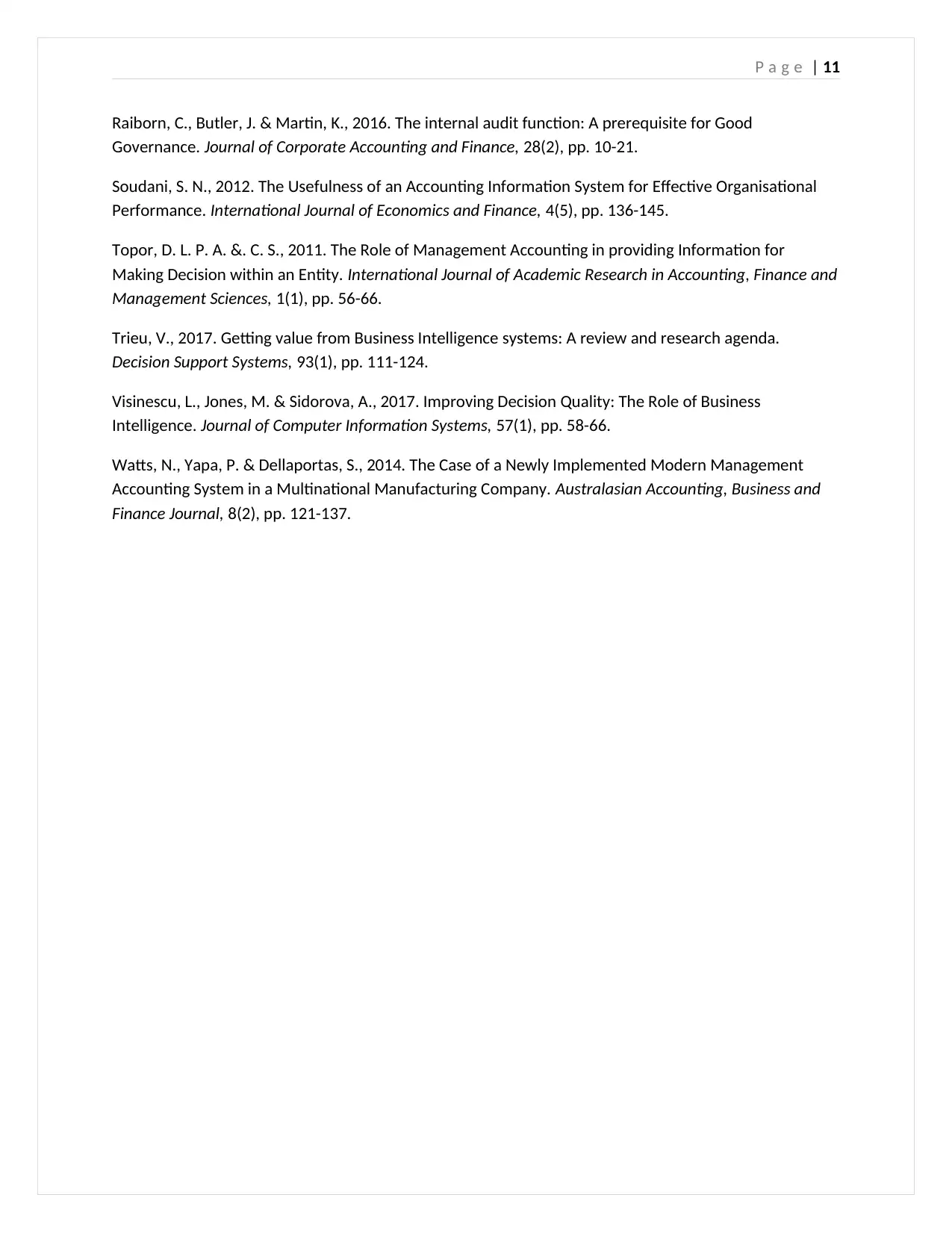
P a g e | 11
Raiborn, C., Butler, J. & Martin, K., 2016. The internal audit function: A prerequisite for Good
Governance. Journal of Corporate Accounting and Finance, 28(2), pp. 10-21.
Soudani, S. N., 2012. The Usefulness of an Accounting Information System for Effective Organisational
Performance. International Journal of Economics and Finance, 4(5), pp. 136-145.
Topor, D. L. P. A. &. C. S., 2011. The Role of Management Accounting in providing Information for
Making Decision within an Entity. International Journal of Academic Research in Accounting, Finance and
Management Sciences, 1(1), pp. 56-66.
Trieu, V., 2017. Getting value from Business Intelligence systems: A review and research agenda.
Decision Support Systems, 93(1), pp. 111-124.
Visinescu, L., Jones, M. & Sidorova, A., 2017. Improving Decision Quality: The Role of Business
Intelligence. Journal of Computer Information Systems, 57(1), pp. 58-66.
Watts, N., Yapa, P. & Dellaportas, S., 2014. The Case of a Newly Implemented Modern Management
Accounting System in a Multinational Manufacturing Company. Australasian Accounting, Business and
Finance Journal, 8(2), pp. 121-137.
Raiborn, C., Butler, J. & Martin, K., 2016. The internal audit function: A prerequisite for Good
Governance. Journal of Corporate Accounting and Finance, 28(2), pp. 10-21.
Soudani, S. N., 2012. The Usefulness of an Accounting Information System for Effective Organisational
Performance. International Journal of Economics and Finance, 4(5), pp. 136-145.
Topor, D. L. P. A. &. C. S., 2011. The Role of Management Accounting in providing Information for
Making Decision within an Entity. International Journal of Academic Research in Accounting, Finance and
Management Sciences, 1(1), pp. 56-66.
Trieu, V., 2017. Getting value from Business Intelligence systems: A review and research agenda.
Decision Support Systems, 93(1), pp. 111-124.
Visinescu, L., Jones, M. & Sidorova, A., 2017. Improving Decision Quality: The Role of Business
Intelligence. Journal of Computer Information Systems, 57(1), pp. 58-66.
Watts, N., Yapa, P. & Dellaportas, S., 2014. The Case of a Newly Implemented Modern Management
Accounting System in a Multinational Manufacturing Company. Australasian Accounting, Business and
Finance Journal, 8(2), pp. 121-137.
1 out of 11
Related Documents
Your All-in-One AI-Powered Toolkit for Academic Success.
+13062052269
info@desklib.com
Available 24*7 on WhatsApp / Email
![[object Object]](/_next/static/media/star-bottom.7253800d.svg)
Unlock your academic potential
Copyright © 2020–2026 A2Z Services. All Rights Reserved. Developed and managed by ZUCOL.




